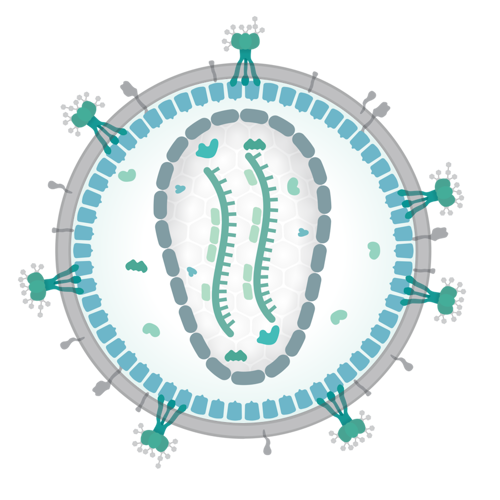
Could scientists change people’s genetic makeup to wipe out genetic diseases?
October 5, 2011

- Related Topics:
- Genetic engineering,
- Genetic conditions,
- Futuristic science,
- Biotechnology,
- Gene therapy,
- Bioethics
A curious high school student from Australia asks:
"Are scientists working on ways to change people’s genetic makeup so that they can remove the genes that cause diseases such as Cystic Fibrosis and cure people of the disease? Could we even wipe out some genetic diseases once and for all?"
I wish I could say that we understand enough about genetic diseases to cure them right now. But sadly, I can't.
Genetic diseases, such as Cystic Fibrosis and Huntington's disease, are caused by small differences in the DNA that we get from each of our parents. These differences affect how we use a particular gene, and that leads to disease.
So we can't really get rid of a gene to cure a disease. We need to either fix the broken gene or keep that broken gene from being passed down in the first place.
Right now it is simply too hard to fix someone's broken genes. And it's even harder to change someone's DNA in a way that the "cured" DNA can be passed onto the next generation. This means we aren't going to be curing or eliminating genetic diseases this way anytime soon.
Technically, though, we could cure genetic disease by keeping broken genes from getting passed on to children. This would almost completely wipe out many genetic diseases in a single generation.
One way to do this is to genetically test everyone for a variety of diseases and only let those people free of disease-causing genes have kids. This wouldn't be perfect since we don't know everything about genetic diseases and so we'd miss some of the ways that people get these diseases. We'd also miss those rare cases where DNA changes on its own to cause a disease. But we'd still be able to eliminate most cases of many different genetic diseases.

Of course for obvious ethical, moral, and practical reasons, this is never going to fly. The government cannot and should not tell us who can and can't have babies. Not only that, but we'd lose whatever unique traits those people had. Losing those traits might actually be worse for the human race than keeping the original genetic disease!
Another option involves something called preimplantation genetic diagnosis, or PGD. In PGD, an egg is fertilized outside of the body and allowed to grow for a bit. Once the embryo grows to about 8 cells, a single cell is removed and tested. Only those embryos that lack the DNA differences that lead to genetic disease would be implanted in a mom's uterus.
But this option is very expensive to do. In fact, I can't even come up with the number of dollars it would take to pull this off. So if we're going to eliminate genetic disease anytime soon, we're probably going to have to fix the people who already have them. And even that is not going to be easy…
Gene Therapy – Attempts to "Cure" Genetic Disease
The only real option right now to fix genetic diseases is to use gene therapy. In gene therapy, the "good" version of a gene is introduced into a patient's DNA. The hope is that this healthy copy of the gene will overcome the problems of the disease version.
Note that we aren't fixing the gene. We're just adding back a working copy. This means we can only cure diseases that are caused by a gene not working. (If you want to figure out which diseases gene therapy might cure, look for the recessive ones… these tend to be the "loss of function" ones.)
Adding a gene sounds pretty straightforward, right? Unfortunately, it's not. It's very hard to get a working gene in every cell of a person's body and our cells tend to reject any genes we add.
So far the only real successes have been with inherited blood diseases. But even these "cures" have come with some pretty severe side effects.

If we did manage to come up with ways to cure these diseases with gene therapy, we still probably wouldn't be wiping them out of the human race. Odds are still very much against getting the normal DNA into sperm or egg cells. That's the only way that the cure would get passed on to the next generation.
But let's say we did somehow get the new DNA into sperm or egg cells… we still wouldn't be able to completely eliminate the disease. Remember, the disease gene is still lurking in the background of a person's DNA.
Because of how DNA is passed on to the next generation, a child will sometimes inherit the disease gene without the normal copy. This child could then end up with the disease. This means we would need to keep using gene therapy to keep the disease at bay.
All of this points to curing the human race of genetic diseases as an incredibly difficult task. But even if we got there, is it worth it in all cases?
Playing With Fire – Risks of Eliminating Genetic Mutations
While many genetic diseases are devastating, some aren't that severe. They can be dealt with by simply changing one's lifestyle.
For example, phenylketonuria (PKU) is a genetic disease that can be treated with a change in diet. Should we try to eliminate this one? Or the many other similar genetic diseases?
Sometimes genetic diseases are just the bad side of a double-edged sword. What if there was a benefit to having the DNA difference that leads to a genetic disease?
For example, some people are more likely to be infected by West Nile Virus because of a DNA difference in their CCR5 gene. But this same difference makes them resistant to HIV and getting AIDS. So do you think we should try to fix this mutation?

A more complicated case is the SERT gene. Some people have a DNA difference in this gene that makes them more likely to become clinically depressed. But this only happens under the wrong circumstances.
People with the same genetic difference raised under different, more healthy circumstances are actually less likely to be depressed. So getting rid of this gene might actually increase the risk for depression in the human race!
As you can see, tinkering with human genetics is tricky business. We aren't technologically competent enough to eliminate any genetic diseases from people yet. And even if we do get there someday, we may never know enough about genes and what they do to make the right decision.
Still, some genetic differences do seem to have minimal benefit and maximal cost (think any difference leading to cystic fibrosis). We may want to eliminate these devastating diseases in the future. But we need to be careful not to take this kind of eugenics too far.

Author: Dr. Maggie Pearce
When this answer was published in 2011, Maggie was a post-doctoral fellow in the Department of Biology, studying protein quality control and neurodegeneration in Ron Kopito's laboratory. Maggie wrote this answer while participating in the Stanford at The Tech program.
 Skip Navigation
Skip Navigation
